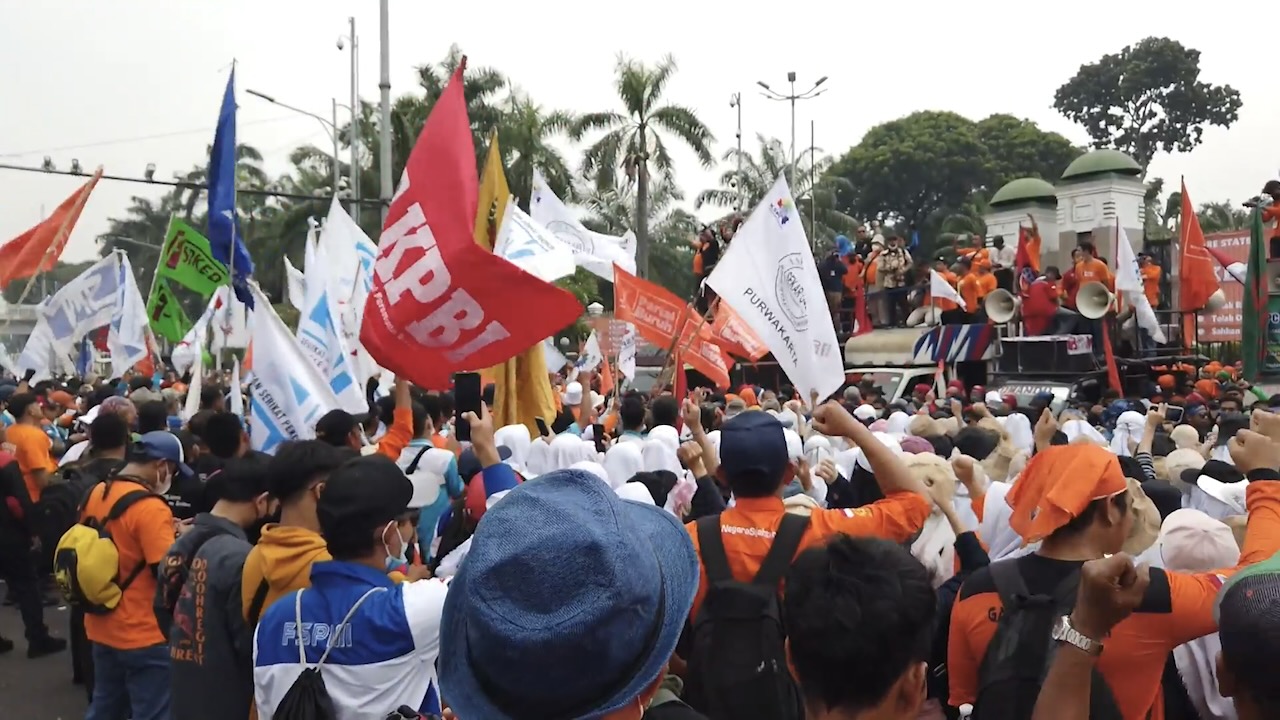Thousands protested against attempts by the Indonesian government to re-introduce the controversial omnibus Job Creation Act. Indonesia’s newly-founded Labour Party organized simultaneous protests in the national capital, Jakarta, and other locations across the country on Wednesday, June 15.
Thousands of workers and protesters congregated for a massive demonstration outside the House of Representatives Building in Jakarta. Major industrial hubs like Bandung, Makassar, Banjarmasin, Banda Aceh, Medan, Batam, Semarang, Surabaya, Ternate, and Ambon among others also witnessed massive demonstrations by labor movements.
The Labour Party was formed in November last year, as a culmination of nearly a year of combined struggle and mobilizations by major trade union confederations and progressive movements in the country against the omnibus law.
The Confederation of Indonesian Prosperous Laborers Unions (KSBSI), Confederation of Indonesian Workers Unions (KSPI), Federation of Indonesian Metal Workers Unions (FSPMI), Indonesian Farmer Union (SPI), Confederation of Indonesian Labour Union (KPBI), and Indonesian Women Movement were among the founding groups of the party.
Apart from their opposition to the Omnibus law, protesters also voiced their dissent against several major legislation and policy decisions being pushed by the government. These include amendment to the rules on legislative processes and proposed liberalization of agriculture.
Protesters also voiced their opposition to recent electoral rules shortening election campaigning to a 75-day period, which the Labour Party has argued would put smaller parties like themselves at a great disadvantage. They also called for the ratification of the bill to protect the rights of domestic workers.
The center of attention though remains to be the omnibus law, a flagship legislation of president Joko “Jokowi” Widodo, who is widely believed to be attempting to re-introduce the law.
“The demonstration which was attended by thousands of workers consisting of elements of labor union organizations, fishermen, farm workers, domestic workers were carried out simultaneously throughout Indonesia,” Said Iqbal, leader of the Labour Party told reporters. “The essence of this action is to strongly reject the omnibus law.”
The legislation titled Job Creation Act was introduced in 2020 and hurriedly passed through the House of Representatives with almost no deliberation within or outside the parliament. Trade unions, students’ groups, and progressive movements came out in large numbers demanding the law’s repeal. Opposition parties also condemned the legislation for the manner in which it was bulldozed through the House.
The law would bring in sweeping changes to 79 existing laws and regulations including those on environment, labor, taxes, and private investments. Trade unions have argued that the law would undermine hard fought protections for job security, minimum wages, paid leaves and severance pay. The law would also do away with limits put on polluting industries, and drastically reduce the number sectors barred from private investments from 300 to 6.
In November last year, Indonesia’s Constitutional Court eventually deemed the law “conditionally unconstitutional”. The court gave the government two years to “repair” the major procedural lapses in the passage of the bill and set it aside from being enacted or even legislated upon them. If the government or the parliament fails to do so, the law will be considered void by default.
Earlier in May, the ruling coalition pushed through legislation to alter laws that govern passage of bills. One of the sticking points in the procedural lapses was the fact that the government did not conduct adequate “public consultations” before passing the law.
Recent legislation would change the definition of what constitutes a “public consultation” for passing of bills and also change procedures for passing omnibus-style bills in the parliament allowing it to include sections unrelated to the main framework of the bill.
These changes to legislative procedures are geared towards re-introducing the Job Creation Act, without much procedural issues. Despite the government’s determination, workers’ movement and environmental groups are expected to continue their struggle against the law in the coming days.





